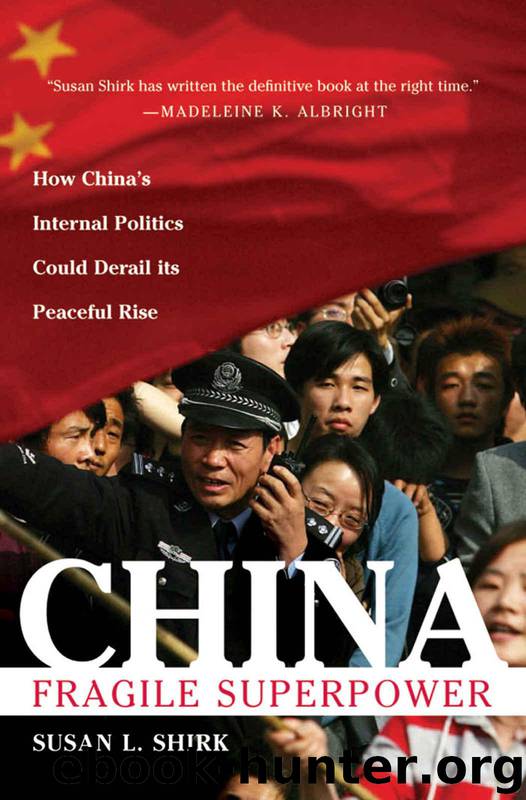China by Susan L. Shirk

Author:Susan L. Shirk
Language: eng
Format: azw3, epub
ISBN: 9780195306095
Publisher: Oxford University Press
Published: 2007-04-16T06:00:00+00:00
Jiang’s Visit to Japan
Jiang Zemin’s disastrous state visit to Japan in 1998 exemplified his domestically oriented approach. Chinese and Japanese diplomats agree on their accounts of what happened:
Jiang went to Japan in November, following South Korea’s president Kim Dae-jung’s trip a month earlier. Originally, Jiang’s trip was supposed to precede Kim’s, but the schedules changed so that it followed Kim’s. The Japanese government had presented Kim with a written apology for its wartime past in exchange for his promise that South Korea would never raise the history issue again.92 In the original planning for Jiang’s trip, the Chinese Foreign Ministry had not intended to request a written apology from Japan. Its original three themes for the visit were Taiwan, Japan’s alliance with the United States, and history. But once Jiang saw that Kim had obtained a written apology, he was determined to get one too as a “deliverable” to bring home to the Chinese people. The two sides had little time for preparatory negotiations. The Chinese foreign minister, Tang Jiaxuan, a Japan expert, had to back up Jiang’s demands for a written apology to show that Tang wasn’t a Japan sympathizer. Some people in the Japanese government favored granting the written apology, but Japanese prime minister Keizo Obuchi called in his senior Foreign Ministry advisors and asked, “Why do you believe that China will put history behind it?” The Foreign Ministry officials recommended that Obuchi give Jiang only an oral apology because, unlike the South Koreans, the Chinese side had shown no sincerity at dropping the history issue even if it received the written apology. In their view, China and Jiang would always play the history card.
The Chinese debated canceling the visit, but Jiang, like many political leaders, overestimated his powers of persuasion and thought that once he arrived, he would get what he wanted. Jiang dropped the other two themes and concentrated like a laser on history. He pressed his case in every meeting, including the televised dinner with the emperor, which people in Japan, the left wing included, found extremely rude. In the end, Jiang came home empty-handed.93 The People’s Daily reported the visit as a great success, but the English-language China Daily, much to the irritation of the Foreign Ministry, criticized Japan for not giving Jiang a written apology. The public lambasted Foreign Minister Tang, who felt humiliated. Jiang himself blamed Tang for the fiasco.
After his trip, Jiang Zemin felt personally insulted by the Japanese. Foreign Ministry officials and other senior leaders, however, did some soul-searching. Japan experts reported to the Central Committee that the “situation was grave,” because China’s fixation on history was creating a backlash in Japan. Zhao Qizheng, the director of the State Council Information Office who was responsible for President Jiang’s image overseas, visited Japan in early 1999, and was shocked at what he heard. He reported back to Jiang Zemin personally that China was making enemies of all the Japanese people.94 Beijing needed to adjust its approach to promote broad-based cooperation with Japan instead.
Download
This site does not store any files on its server. We only index and link to content provided by other sites. Please contact the content providers to delete copyright contents if any and email us, we'll remove relevant links or contents immediately.
| Arms Control | Diplomacy |
| Security | Trades & Tariffs |
| Treaties | African |
| Asian | Australian & Oceanian |
| Canadian | Caribbean & Latin American |
| European | Middle Eastern |
| Russian & Former Soviet Union |
The Secret History by Donna Tartt(19088)
The Social Justice Warrior Handbook by Lisa De Pasquale(12190)
Thirteen Reasons Why by Jay Asher(8910)
This Is How You Lose Her by Junot Diaz(6887)
Weapons of Math Destruction by Cathy O'Neil(6280)
Zero to One by Peter Thiel(5802)
Beartown by Fredrik Backman(5754)
The Myth of the Strong Leader by Archie Brown(5507)
The Fire Next Time by James Baldwin(5446)
How Democracies Die by Steven Levitsky & Daniel Ziblatt(5219)
Promise Me, Dad by Joe Biden(5153)
Stone's Rules by Roger Stone(5088)
A Higher Loyalty: Truth, Lies, and Leadership by James Comey(4964)
100 Deadly Skills by Clint Emerson(4925)
Rise and Kill First by Ronen Bergman(4789)
Secrecy World by Jake Bernstein(4753)
The David Icke Guide to the Global Conspiracy (and how to end it) by David Icke(4720)
The Farm by Tom Rob Smith(4512)
The Doomsday Machine by Daniel Ellsberg(4490)
